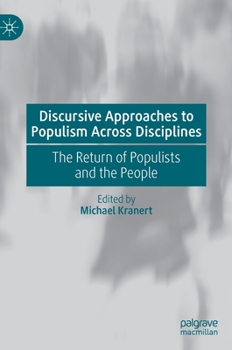Discursive Approaches to Populism Across Disciplines: The Return of Populists and the People
Select Format
Select Condition 
Book Overview
This edited book presents a cross-disciplinary and international conversation about the discursive nature of 'populist' politics. Based on the idea that language and meaning making are central to the political process, the authors present research originating from disciplines such as sociology, political science, linguistics, gender studies and education, giving credence to the variety and context dependence of both populist discourse and its analysis. Using a variety of different theoretical frames, the volume examines international case studies from Europe, Africa, Asia and the Americas, looking at different modes of populism as well as the interaction of populism with other ideologies and belief systems. The chapters draw on several disciplines, and will be of interest to scholars working in linguistics, political studies, journalism, rhetoric and discourse analysis.





